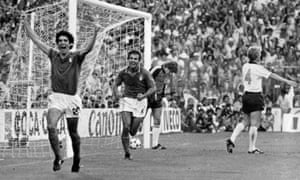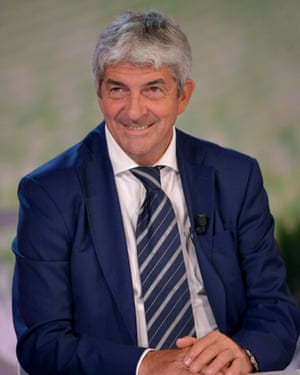The footballer Paolo Rossi, who has died aged 64 of lung cancer, became a national hero in Italy after scoring six times in the 1982 World Cup tournament in Spain, including a crucial first goal in the 3-1 victory over West Germany in the final.
That win was a cathartic moment for the nation, which had been subject to significant social and political unrest for a number of years and, despite being regarded as one of the world’s premier footballing nations, had not won a World Cup since 1938. With the victory came an incalculable lift to the nation’s spirits, and Rossi was at the centre of the celebrations.
The subsequent turnaround in Italy’s mood in many ways mirrored Rossi’s own personal redemption: for a couple of years before the World Cup he had been mired in one of the biggest scandals in footballing history, banned for two years for his role in a match-fixing scheme that encompassed many of Italy’s biggest clubs. He had returned to the game only eight weeks before the World Cup finals, and in the first three matches of the tournament the rust had shown alarmingly.
In the second round of group stages, however, Rossi exploded into action with a brilliant hat-trick in a 3-2 win over the tournament favourites, Brazil, who included players of the exciting calibre of Sócrates, Zico and Falcão. With his mojo returned to full working order, he scored both goals in a 2-0 win over Poland in the semi-finals and then gave Italy the lead after 57 minutes against West Germany as they won the final in Madrid.
That decisive striker’s goal was a typical Rossi effort, a stooping header inside the six-yard box, where he operated so stealthily and effectively. Although without great physical presence – he was rather slightly built and stood at 5ft 10in – Rossi was a master at stealing-in behind defences, gaining a precious fraction of a second through his quick thinking, great ball control and his balletic, darting movements into the danger area.
On his return to the domestic scene with Juventus after the 1982 World Cup, those skills helped him to win two Italian league titles and to pick up winners’ medals in the European Cup and European Cup Winners’ Cup. But his career was relatively short, and he retired at the age of 30 because of injury.

Born in Prato in Tuscany, Rossi had no problem persuading his father, Vittorio, a keen amateur footballer, that his young talent could take him into the professional game. But his mother, Amelia, was harder to convince, and it was only with her grudging approval that he signed for Juventus at 16 in 1972, initially as a winger. In Paolo’s early days his mother’s doubts seemed to be justified, as he was laid low by a series of injuries and appeared only rarely for the first team.
On loan to unfashionable second division Vicenza, he was switched to a central striking role, and there he was able to demonstrate his rare ability to ghost in behind defences. He was top scorer for the club in the 1976-77 season as they gained promotion from Serie B to Serie A, and the following year he had the highest tally of any player in the top flight, scoring 24 as his side finished second.
That form won him selection for the 1978 World Cup finals in Argentina, in which he scored three goals – against France, Hungary and Austria – as Italy finished fourth. At that stage it looked as if his career was on a relentlessly upward trajectory, but more injuries followed and Vicenza were relegated in 1978-79 as Rossi spent much of the season in the treatment room. Forced to seek top-flight football with a move to Perugia, it was there that he became embroiled in the nationwide 1980 Totonero match-fixing scandal.
Rossi was arrested after it emerged that a 2-2 draw between Perugia and Avellino, in which he had scored both his side’s goals, had been fixed by a betting syndicate. Although he admitted having been approached to take a bribe, he said he had not taken up the offer. Nonetheless, after an official investigation into other widespread irregularities across the country, he was found guilty and given a three-year ban, later reduced to two on appeal. He was one of 20 players from 11 clubs to be suspended, with others receiving bans of between six months and six years.

During his exile Rossi was allowed to train with Juventus, and it was with the Turin side that he returned, scoring one goal in three appearances at the end of the 1981-82 season as Juventus won Serie A. Clearly in poor shape, and with just two months to go until the World Cup finals in Spain, not many expected him to be fit enough, either physically or mentally, for inclusion in the tournament squad. But Italy’s manager, Enzo Bearzot, had no such doubts, and he was selected immediately.
After the glory in Madrid, which won Rossi the 1982 Ballon d’Or as Europe’s best footballer, he secured further honours with Juventus, winning the Italian Cup in 1983, the European Cup Winners’ Cup and the Serie A title in 1984, and then the European Cup in 1985, in a 1-0 win against Liverpool that was irretrievably marred by the death of 39 fans in the Heysel stadium disaster.
The next year Rossi transferred to Milan, but spent only a season there before moving to Hellas Verona. His injury problems had returned, and despite being picked by Italy in the 1986 World Cup finals squad, he was unable to play in any of the tournament games. He retired in 1987, having helped Hellas Verona to finish fourth in Serie A. For Italy he had scored 20 goals in 48 matches and for his various clubs just over 100 goals in 250 appearances.
In retirement Rossi moved into the world of property development, and owned and ran a vineyard near Arezzo in Tuscany. He also worked as a pundit for various television stations, including Sky, where he was admired for his down-to-earth presence.
His first marriage, to Simonetta Rizzato, ended in divorce. He is survived by his second wife, Federica Cappelletti, whom he married in 2010, their two daughters, Maria and Sofia, and a son, Alessandro, from his first marriage.
• Paolo Rossi, footballer, born 23 September 1956; died 9 December 2020
Source link